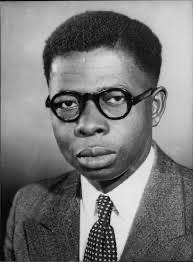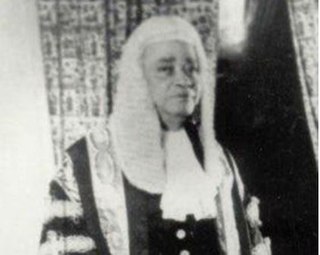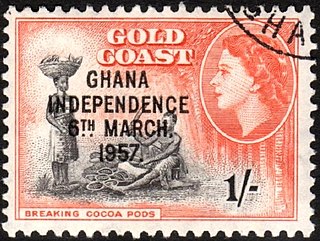Related Research Articles

Francis Kwame Nkrumah was a Ghanaian politician,political theorist,and revolutionary. He served as Prime Minister of the Gold Coast from 1952 until 1957,when it gained independence from Britain. He was then the first Prime Minister and then the President of Ghana,from 1957 until 1966. An influential advocate of Pan-Africanism,Nkrumah was a founding member of the Organization of African Unity and winner of the Lenin Peace Prize from the Soviet Union in 1962.

Joseph Arthur Ankrah was a Ghanaian army general who was head of state of Ghana from 1966 to 1969 as Chairman of the National Liberation Council. He was Ghana's first military head of state. Ankrah also served as Chairperson of the Organisation of African Unity from 24 February 1966 to 5 November 1966. Previously,Ankrah was appointed the first commander of the Ghana Army in 1961.

Joseph Kwame Kyeretwie Boakye Danquah was a Ghanaian politician,scholar,anglophile,lawyer and statesman. He was a politician in pre- and post-colonial Ghana,which was formerly the Gold Coast.

Ako Adjei,was a Ghanaian statesman,politician,lawyer and journalist. He was a member of the United Gold Coast Convention and one of six leaders who were detained during Ghana's struggle for political independence from Britain,a group famously called The Big Six. Adjei became a member of parliament as a Convention People's Party candidate in 1954 and held ministerial offices until 1962 when as Minister for Foreign Affairs he was wrongfully detained for the Kulungugu bomb attack.

William Ofori Atta,popularly called "Paa Willie",was a Ghanaian founding member of the United Gold Coast Convention (UGCC) and one of the founding fathers of Ghana as one of "The Big Six" detained by the British colonial government in the then Gold Coast. He later became a Minister for Foreign Affairs in Ghana's second republic between 1971 and 1972.

Sir Emmanuel Charles Quist,also known as Paa Quist was a barrister,educator and judge who served as the first Speaker of the Gold Coast Legislative Assembly and the first Speaker of the Parliament of Ghana.

Dr. Kwame Nkrumah was the first Prime Minister and first President of Ghana. Nkrumah had run governments under the supervision of the British government through Charles Arden-Clarke,the Governor-General. His first government under colonial rule started from 21 March 1952 until independence. His first independent government took office on 6 March 1957. From 1 July 1960,Ghana became a republic and Nkrumah became the first president of Ghana.

Ghana gained independence from the British on 6 March 1957. It is a member of the Commonwealth of Nations. The country became a republic on July 1,1960.

The Attorney General of Ghana is the chief legal advisor to the Ghanaian government. The attorney general is also responsible for the Ministry of Justice. The Attorney General also serves as a member of the General Legal Council which regulates legal practice in Ghana.
The following is a timeline of the history of the city of Accra,Ghana.

Archibald "Archie" Casely-Hayford was a British-trained Ghanaian barrister and politician,who was involved in nationalist politics in the former Gold Coast. Having joined the Convention People's Party (CPP),in 1951 he was elected Municipal Member for Kumasi and was appointed by Kwame Nkrumah Minister of Agriculture and Natural Resources in the government of the First Republic. When Nkrumah declared Ghana's Independence on 6 March 1957,he was photographed on the podium flanked by Casely-Hayford,together with Kojo Botsio,Komla Agbeli Gbedemah,Nathaniel Azarco Welbeck and Krobo Edusei.
George Commey Mills-Odoi was the first Ghanaian Attorney General of the Republic of Ghana. He was a supreme court judge and the first Ghanaian to hold the dual offices of Solicitor-General and Director of Public Prosecutions.

Theodore Shealtiel Clerk,was an urban planner on the Gold Coast and the first formally trained,professionally certified Ghanaian architect. Attaining a few historic firsts in his lifetime,Theodore Clerk became the chief architect,city planner,designer and developer of Tema which is the metropolis of the Tema Harbour,the largest port in Ghana. The first chief executive officer (CEO) of the Ghanaian parastatal,the Tema Development Corporation as well as a presidential advisor to Ghana's first Head of State,Kwame Nkrumah,T. S. Clerk was a founding member and the first president of the first post-independent,wholly indigenous and self-governing Ghanaian professional body,the Ghana Institute of Architects (GIA),that had its early beginnings in 1963. He was also an Associate of the Royal Institute of British Architects and the Royal Town Planning Institute.
Joe-Fio Neenyann Meyer was a Ghanaian diplomat and trade unionist.
Harry Amoo Dodoo was a Ghanaian chartered accountant,public servant and businessman who led the Ghana Cocoa Board at different times as chief accountant,general manager,managing director,chief executive and chairman. He was the first Gold Coast native to be a chartered accountant and the first Gold Coast indigene to work with Cassleton Elliot and Company.
Joseph Henry Allassani was a Ghanaian teacher and politician. He was a member of parliament and a minister of state during the first republic. He was the first health minister in the first republic of Ghana.
Kwame Boahene Yeboah-Afari was an educator and a politician. He served in various ministerial portfolios of the first republic including serving as Ghana's first Minister for Agriculture and the first Regional Minister for the Brong Ahafo Region. He also served as a member of parliament for the Sunyani East constituency.
Modesto Kwasi Apaloo was a Ghanaian politician. He was a Member of parliament and was the founder and leader of the defunct Anlo Youth Organisation.

Allotei Kobina Konuah was a Ghanaian educationist,sportsman and city administrator. He was executive chairman of Accra City Council from Februabry 1979 until his death in October 1979. Before this,he was headmaster of Accra Academy from 1953 to 1967. He was team manager for Ghana at the 1952 Summer Olympics and the 1954 Commonwealth Games,which marked the first appearances at both competitions for Ghana and the only appearances as a British colony.
References
- ↑ Jubilee Ghana. A 50-year news journey thro' Graphic. Accra: Graphic Communications Group Ltd. 2006. p. 21. ISBN 9988-8097-8-6.
New job for Bing
- ↑ United Nations Technical Assistance Housing Mission to Ghana (1957). "Appendix P: List of Persons And Parties Interviewed By The Mission". Housing in Ghana. New York: United Nations, Technical Assistance Programme. p. 147. Retrieved 17 April 2022.
- ↑ "PAST MINISTERS". www.mojagd.gov.gh. Accra: Ministry of Justice and Attorney General's Department. Archived from the original on 9 June 2019. Retrieved 17 April 2022.
- ↑ Matthews, Mr; Salam, Dr; Stern, Mr, eds. (October 1956). "The Eagle" (PDF). The Eagle . LVII (249). St John's College, Cambridge: 64b. Retrieved 17 April 2022.